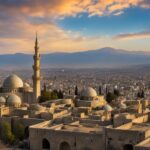Syria, a country marred by the Syrian conflict and political turmoil, holds within its borders a hidden beauty that often goes unnoticed. Delve beneath the headlines and discover a land with a rich history, breathtaking landscapes, and a resilient population. In this article, we will explore the biblical importance of Syria, delve into notable figures linked to the region, uncover its appearance and function in biblical times, examine major biblical events that have shaped its history, and provide insights into the current state of the country.
Key Takeaways:
- Syria has immense biblical importance, with prominent cities like Damascus and Aleppo playing significant roles in biblical stories and events.
- Notable biblical figures such as Abraham, Jacob, and Paul of Tarsus had transformative experiences in Syria.
- In biblical times, Syria featured diverse landscapes, thriving cities like Damascus, and a rich cultural tapestry.
- Major biblical events that took place in Syria include Abraham’s journey, Jacob’s encounters, the Israelites’ Exodus, and Paul’s conversion.
- Today, Syria faces challenges including an ongoing civil war, the leadership of Bashar al-Assad, and the displacement of Syrian refugees.
The Biblical Importance of Syria
Syria holds immense biblical importance, mentioned throughout the Bible in various contexts. Cities like Damascus and Aleppo play prominent roles in biblical narratives, showcasing the significance of this region. Notable figures such as Abraham, Jacob, and Paul of Tarsus had encounters in Syria, which greatly influenced their spiritual journeys.
Abraham, known as the father of many nations, traveled through Syria on his path to the Promised Land. Jacob, the son of Isaac and grandson of Abraham, had transformative experiences in Syria, including meeting and marrying his wives Rachel and Leah. Paul of Tarsus, a pivotal figure in early Christianity, had a life-changing encounter on the road to Damascus in Syria.
Understanding the biblical importance of Syria provides valuable insights into the cultural and historical heritage of the country. It allows us to appreciate the connection between biblical events and the geographical landscape, highlighting the enduring significance of Syria in religious and historical contexts.
“The region of Syria, with its cities and figures, plays a crucial role in the biblical narrative, shaping the stories of Abraham, Jacob, and Paul of Tarsus.”
Table: Notable Biblical Figures Linked to Syria
| Figure | Significance |
|---|---|
| Abraham | Considered the father of many nations, he traveled through Syria on his way to the Promised Land. |
| Jacob | Son of Isaac and grandson of Abraham, he had significant experiences in Syria, including marrying his wives Rachel and Leah. |
| Paul of Tarsus | Converted to Christianity on the road to Damascus in Syria, becoming one of the foremost early Christian missionaries. |
By exploring the biblical importance of Syria, we gain a deeper understanding of the country’s heritage and its role in shaping the narrative of the Bible. It underscores the enduring influence of Syria in religious history and invites us to appreciate the cultural and spiritual significance of this remarkable land.
Notable Biblical Figures Linked to Syria
Syria is closely associated with several notable figures in biblical history. These individuals played significant roles and had transformative experiences in the region. Understanding their connections to Syria offers valuable insights into the country’s rich biblical heritage.
Abraham
Abraham, known as the father of many nations, had a journey that took him through Syria. Although he was originally from the city of Ur in modern-day Iraq, he traveled through Syria on his way to the Promised Land. His encounters and experiences in Syria influenced his spiritual journey and the fulfillment of God’s promises.
Jacob
Jacob, the son of Isaac and grandson of Abraham, also had significant connections to Syria. He married his wives, Rachel and Leah, while residing in Syria. These marriages played a crucial role in the formation of the twelve tribes of Israel. Jacob’s time in Syria shaped the course of his life and the destiny of his descendants.
Paul of Tarsus
Paul of Tarsus, an important figure in the early Christian movement, had a life-changing encounter in Syria. Although he was born in modern-day Turkey, it was on the road to Damascus, a city in Syria, where Paul experienced a vision of Jesus Christ. This encounter led to his conversion and subsequent missionary work, making him one of the most influential figures in early Christianity.
Table: Notable Biblical Figures Linked to Syria
| Name | Connection to Syria |
|---|---|
| Abraham | Traveled through Syria on his way to the Promised Land |
| Jacob | Married his wives, Rachel and Leah, in Syria |
| Paul of Tarsus | Experienced a transformative vision on the road to Damascus |
By exploring the lives and experiences of these notable biblical figures, we gain a deeper understanding of Syria’s significance in the biblical narrative. These connections highlight the country’s role in shaping the spiritual journeys of influential individuals and the broader history of faith.
Syria in Biblical Times
In biblical times, Syria was a region of great significance, both geographically and politically. It encompassed several city-states, including Damascus, which was a vital center of trade, culture, and political power. The region featured diverse landscapes, from vast deserts to fertile plains and mountainous terrain.
One of the most notable aspects of Syria’s appearance in biblical times was its thriving cities. Damascus, often referred to as the oldest continuously inhabited city in the world, played a significant role in the trade routes of the ancient world. It served as a hub for commerce, attracting people from various backgrounds and contributing to the rich cultural tapestry of ancient Syria.
The function of Syria in biblical times extended beyond trade and commerce. It was a region where major biblical events took place, leaving lasting impacts on its history. For example, the journey of the Israelites during the Exodus involved passages through Syrian territories, shaping the narrative of their liberation and subsequent settlement. Syria also served as a backdrop for important encounters and experiences of notable biblical figures like Abraham, Jacob, and Paul of Tarsus.
Biblical Figures in Syria
Abraham, known as the father of many nations, traveled through Syria on his journey from Ur to the Promised Land. Jacob, the son of Isaac, had significant interactions and experiences in Syria, including marrying his wives Rachel and Leah. Paul of Tarsus, an influential figure in early Christianity, had a transformative encounter on the road to Damascus in Syria, which led to his conversion and played a pivotal role in the spread of Christianity.
Overall, Syria’s appearance and function in biblical times were marked by its diverse landscapes, thriving cities, and its role in significant biblical events. Understanding the biblical importance of Syria offers valuable insights into the country’s cultural and historical heritage, which continues to shape its identity to this day.
Major Biblical Events in Syria’s History
Syria has been a witness to numerous major biblical events that have had a profound impact on its history and the larger narrative of the Bible. These events are not only significant in religious context but also shed light on the historical development of the region. Let’s explore some of the major biblical events that unfolded in Syria.
The Journey of Abraham
One of the most notable events associated with Syria is Abraham’s departure from Ur. As a central figure in the Bible and the father of many nations, Abraham’s journey shaped the course of history. On his way to the Promised Land, Abraham passed through Syria, bringing his faith and belief in the one true God to the region.
The Conversion of Paul
Another pivotal event that took place in Syria was the conversion of Paul on the road to Damascus. Paul, originally known as Saul, was a zealous persecutor of Christians. However, on his journey to Damascus, he experienced a dramatic encounter with Jesus Christ, which led to his conversion and subsequent role as an influential apostle of Christianity.
The Exodus and the Israelites
The Exodus, a significant event in the history of the Israelites, also involved Syria. As the Israelites fled from Egypt under the leadership of Moses, they traversed through Syria on their way to the Promised Land. This journey, marked by miracles and divine intervention, played a crucial role in shaping the identity and destiny of the Israelite nation.
These major biblical events in Syria’s history illustrate the deep connection between the region and the biblical narrative. They highlight Syria’s role as a significant backdrop for key figures and events that have shaped the course of religious and human history.
| Biblical Event | Description |
|---|---|
| The Journey of Abraham | Abraham’s departure from Ur and his passage through Syria on his way to the Promised Land. |
| The Conversion of Paul | Paul’s transformative encounter with Jesus Christ on the road to Damascus, leading to his conversion and subsequent missionary work. |
| The Exodus and the Israelites | The Israelites’ journey from Egypt to the Promised Land, passing through Syria and experiencing God’s guidance and miracles along the way. |
Syria Today
Presently, Syria is facing severe challenges as a result of the ongoing Syrian conflict and civil war. The conflict, which started in 2011, has caused immense devastation and loss of life in the country. The leadership of President Bashar al-Assad has been a topic of international attention and controversy throughout the conflict. Additionally, millions of Syrians have been displaced from their homes, resulting in a massive refugee crisis that has had a significant impact on neighboring countries and the international community.
The Syrian conflict has led to widespread destruction of infrastructure, including homes, hospitals, schools, and other essential services. This has created significant challenges for the Syrian people, who are now grappling with the task of rebuilding their communities and restoring their lives. The process of reconstruction is complex and demanding, requiring extensive resources, support, and assistance from the international community.
Furthermore, Syria is hosting millions of Syrian refugees who have fled the country seeking safety and security. The refugee crisis has placed a tremendous strain on neighboring countries and international humanitarian organizations. Efforts to support and assist Syrian refugees are ongoing, with organizations providing shelter, healthcare, education, and other essential services to those in need. The international community continues to work towards finding a lasting solution to the conflict and addressing the needs of both the displaced Syrians and the host communities.
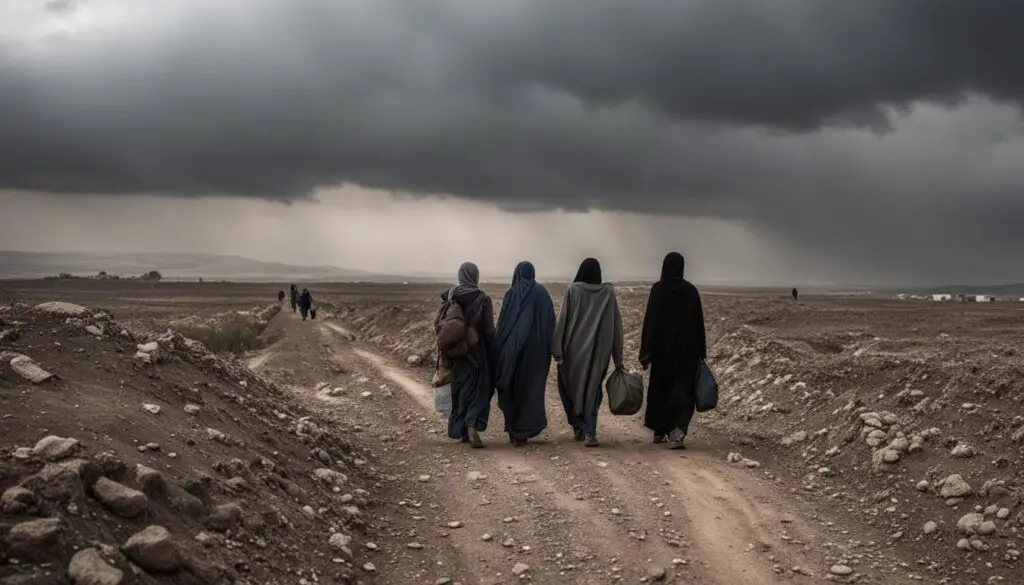
The Impact of the Syrian Conflict
The Syrian conflict has had far-reaching consequences, not only for the people of Syria but also for the region and the world. The conflict has resulted in a massive humanitarian crisis, with millions of Syrians in desperate need of assistance. The destruction of infrastructure and economies has led to significant challenges in providing essential services, such as healthcare, education, and clean water.
The conflict has also had geopolitical implications, with various regional and international actors involved in the conflict. The situation in Syria has strained relations between countries and has become a complex web of political, military, and social dynamics. The conflict has also created a power vacuum, allowing extremist groups like ISIS to emerge and further destabilize the region.
Despite the challenges, the Syrian people have shown incredible resilience and strength in the face of adversity. The international community must continue to support efforts to bring about a peaceful resolution to the conflict, provide humanitarian aid to those affected, and assist in the long-term process of rebuilding and reconstruction in Syria.
The Resilience of the Syrian People
Amidst the challenges and turmoil that have plagued Syria, the resilience of its people shines through. Despite the devastating effects of the ongoing conflict, Syrians have shown remarkable strength and determination in the face of adversity. The Syrian people have displayed a deep-rooted commitment to rebuilding their communities and preserving their cultural heritage.
Countless individuals and organizations are working tirelessly to provide humanitarian aid, support the displaced population, and promote peace and stability in Syria. From medical professionals who risk their lives to care for the wounded, to educators who continue to teach children in makeshift classrooms, Syrians are rising above unimaginable circumstances to rebuild their lives and create a better future for themselves and their families.
“The Syrian people have shown incredible resilience in the face of unimaginable challenges. They refuse to let the conflict define them and are determined to rebuild their country and restore peace.” – Humanitarian Aid Worker
The resilience of the Syrian people is also evident in their efforts to preserve their cultural heritage. Despite the destruction of historical sites and artifacts, Syrians are determined to safeguard their traditions, art, and history. Cultural events, such as music festivals and traditional crafts exhibitions, are organized to celebrate and promote the rich cultural identity of Syria.
Syria’s Resilience in Numbers
| Category | Statistics |
|---|---|
| Displaced Population | Over 6 million Syrians internally displaced |
| Refugees | More than 5 million Syrians seeking refuge in neighboring countries |
| Humanitarian Aid | $3.2 billion pledged by international donors for Syria in 2021 |
| Education | 7,000 temporary learning spaces established to ensure access to education for Syrian children |
These numbers paint a vivid picture of the scale of the challenges faced by the Syrian people. However, they also reflect the resilience and determination of Syrians to overcome these obstacles and rebuild their lives. The international community plays a crucial role in supporting these efforts by providing humanitarian aid, advocating for peace, and working towards long-term solutions to the Syrian crisis.
As the resilience of the Syrian people continues to inspire, it is important to recognize their strength and support their ongoing efforts to rebuild, heal, and create a brighter future for themselves and their country.
Cultural and Natural Beauty in Syria
Syria is a country that not only boasts a rich cultural heritage but also showcases breathtaking natural beauty. Despite the challenges it faces, the land of Syria is adorned with ancient ruins, architectural marvels, and historical sites that have stood the test of time.
In terms of cultural beauty, Syria is home to the famous Umayyad Mosque in Damascus, a magnificent structure that dates back to the 8th century. Its intricate architecture and stunning mosaic artistry make it a captivating destination for tourists and spiritual seekers alike. The ancient city of Palmyra also stands as a testament to Syria’s cultural wealth, with its well-preserved ruins drawing visitors from around the world.
When it comes to natural beauty, Syria offers diverse landscapes that are sure to leave visitors in awe. The Orontes River valley with its lush greenery and picturesque views is a paradise for nature lovers. On the other hand, the Al-Hajar Al-Aswad mountain range provides a rugged and majestic backdrop for adventurous souls seeking breathtaking vistas.
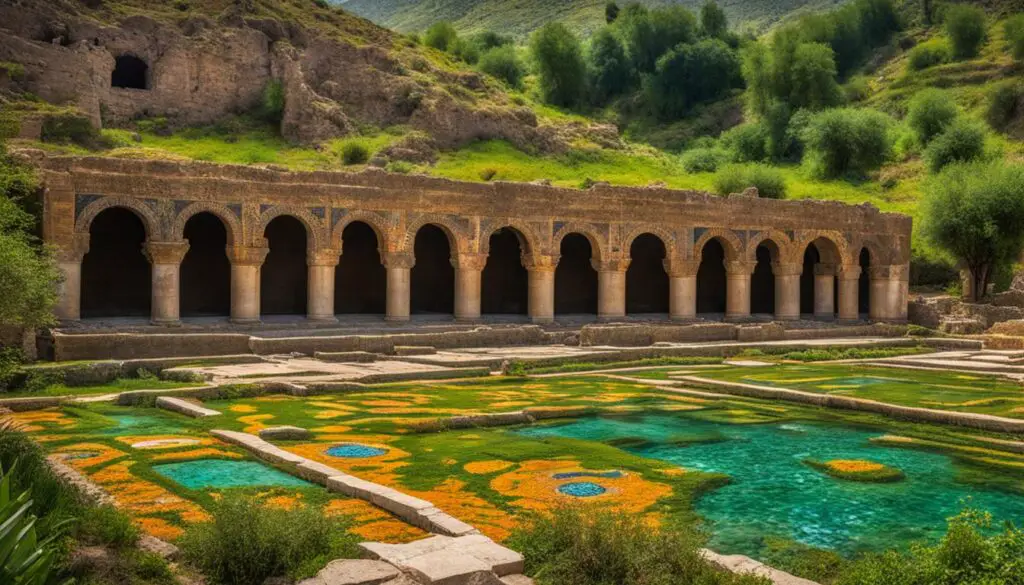
The Beauty of Syria’s Cultural and Natural Heritage
| Cultural Beauty | |
|---|---|
| Umayyad Mosque | An architectural masterpiece showcasing intricate design and historical significance. |
| Palmyra | Ancient ruins that transport visitors back in time, offering a glimpse into Syria’s rich history. |
| Natural Beauty | |
| Orontes River Valley | A mesmerizing valley with lush vegetation and picturesque landscapes. |
| Al-Hajar Al-Aswad Mountain Range | Rugged mountains that offer breathtaking views and opportunities for outdoor exploration. |
Despite the turmoil that has affected Syria, its cultural and natural beauty remain intact, waiting to be rediscovered and appreciated. As peace and stability return to the region, Syria’s heritage will continue to inspire awe and captivate the hearts of those who venture into its embrace.
Rebuilding and Reconstruction Efforts in Syria
Since the outbreak of the Syrian conflict, rebuilding and reconstruction efforts have become critical for the nation’s recovery. International organizations, governments, and humanitarian agencies have been working tirelessly to provide assistance and support to rebuild infrastructure, restore essential services, and promote economic recovery. The process of reconstruction is complex and challenging, requiring significant resources, coordination, and long-term commitment.
Table: International Aid for Syrian Reconstruction Efforts
| Country/Organization | Aid Commitment |
|---|---|
| European Union | $8.3 billion |
| United States | $6.5 billion |
| Gulf Cooperation Council (GCC) | $2.5 billion |
| United Nations Development Programme (UNDP) | $1.7 billion |
| Turkey | $500 million |
Despite the challenges, progress has been made in areas such as renovating schools, rebuilding hospitals, and restoring basic infrastructure. However, the scale of destruction is immense, and much more needs to be done to fully rebuild the country and improve the lives of its people. In addition to physical reconstruction, efforts are also being made to address social and psychological support for the affected population.
“Rebuilding Syria is not just about bricks and mortar; it’s about healing wounds, restoring hope, and rebuilding communities. It requires a comprehensive approach that takes into account social cohesion, economic development, and political stability.” – United Nations Secretary-General António Guterres
The rebuilding process in Syria is ongoing, and it will require sustained international support and collaboration. Beyond the physical infrastructure, it is crucial to invest in education, healthcare, and livelihood opportunities to create a sustainable future for the Syrian people. By focusing on long-term recovery and development, Syria can rebuild stronger and more resilient than ever before.
Tourism Potential in Syria
Syria possesses immense tourism potential, with its rich historical and cultural heritage drawing visitors from around the world. Despite the ongoing conflict, the country’s archaeological sites, ancient ruins, and traditional markets have long been captivating attractions. From the breathtaking ruins of Palmyra to the majestic Umayyad Mosque in Damascus, Syria offers a glimpse into its glorious past. Visitors can explore the ancient city of Aleppo, a UNESCO World Heritage site, with its labyrinthine streets and stunning citadel. The coastal city of Latakia boasts beautiful beaches and a vibrant Mediterranean atmosphere.
For history enthusiasts, a visit to the Roman theater in Bosra or the Crusader castle of Krak des Chevaliers is a must. These architectural marvels stand as testaments to the country’s rich past and offer a chance to walk in the footsteps of ancient civilizations. Nature lovers can marvel at the scenic beauty of Syria’s landscapes, from the verdant valleys of the Orontes River to the rugged mountains of the Al-Hajar Al-Aswad range.
As stability and peace gradually return to Syria, there is hope that the tourism industry can flourish once again, providing economic opportunities and showcasing the country’s unique treasures. By supporting responsible tourism and promoting sustainable practices, we can contribute to the preservation of Syria’s cultural heritage and help rebuild the nation’s economy. Let us not forget the beauty and resilience of this remarkable country, and let us embrace the opportunity to rediscover its hidden gems.
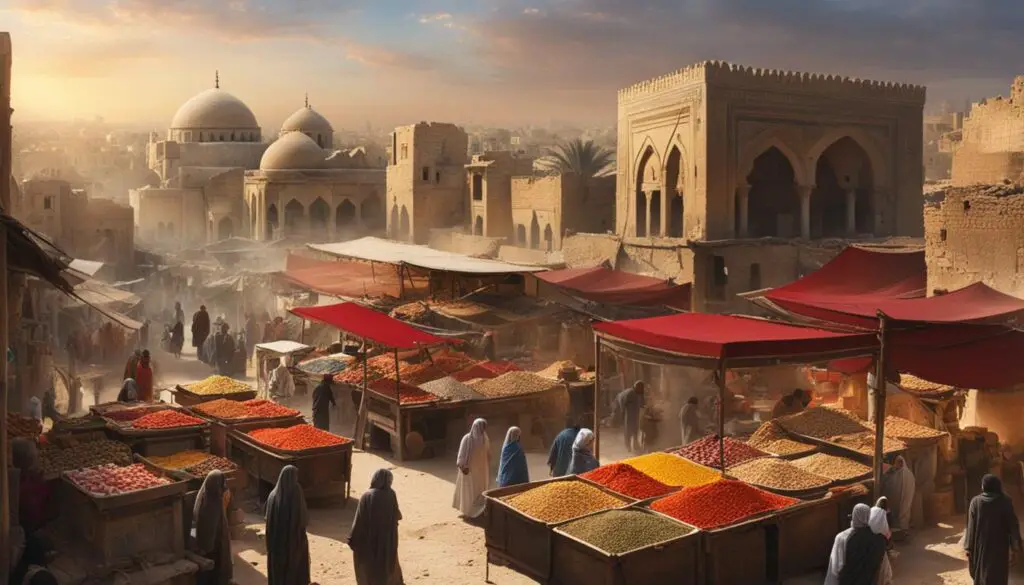
The Potential of Syrian Tourism
“Syria’s rich history and cultural heritage make it a captivating destination for travelers seeking unique experiences. Despite the challenges it has faced, the country has an abundance of archaeological sites, ancient ruins, and natural beauty that are waiting to be explored. By promoting responsible tourism and investing in infrastructure, Syria can rebuild its tourism industry and showcase its rich cultural heritage to the world.” – Travel expert, Sarah Thompson
Supporting Syrian Refugees
The ongoing Syrian conflict has led to a significant displacement of people, resulting in a humanitarian crisis. Syrian refugees, forced to flee their homes in search of safety and stability, need support from the international community to rebuild their lives. Various organizations, governments, and individuals around the world are actively engaged in providing aid and assistance to these refugees.
“We cannot turn a blind eye to the suffering of Syrian refugees. It is our moral duty to extend a helping hand and offer them a chance to start anew,” says Jennifer Thompson, a humanitarian worker who has been actively involved in supporting Syrian refugees. “By providing shelter, food, education, and healthcare, we can help alleviate their immediate needs and empower them to rebuild their lives.”
Efforts to support Syrian refugees include providing temporary and long-term shelter options, ensuring access to clean water and sanitation facilities, and offering educational and vocational training opportunities. Additionally, healthcare services are crucial to address the physical and mental health needs of displaced individuals, especially women, children, and the elderly.
Advocacy plays a critical role in raising awareness and mobilizing resources for supporting Syrian refugees. By shedding light on their plight and sharing their stories, we can foster understanding, empathy, and compassion among individuals and communities. This collective support can help create a more inclusive and welcoming environment for refugees, enabling them to rebuild their lives with dignity and hope.
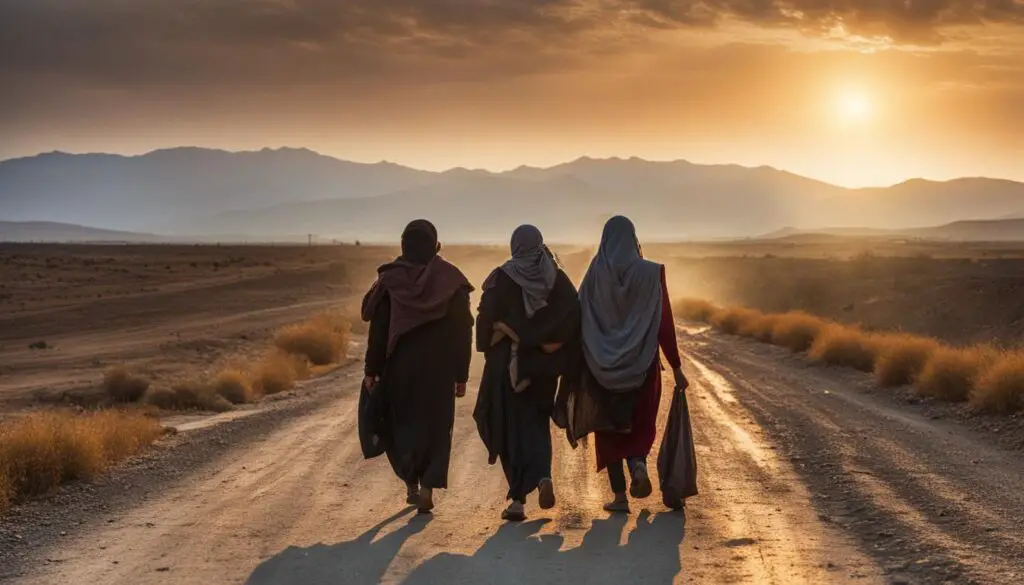
In conclusion, supporting Syrian refugees is an essential endeavor that requires global cooperation and empathy. By offering assistance, advocating for their rights, and providing opportunities for rebuilding, we can help restore dignity and stability to the lives of those affected by the Syrian conflict.
Conclusion
Syria, a country with a rich history and stunning landscapes, holds immense biblical importance. It served as the backdrop for numerous significant events and stories in the Bible. Notable figures like Abraham, Jacob, and Paul of Tarsus had transformative encounters and experiences in Syria that shaped their spiritual journeys. Understanding the biblical significance of Syria provides valuable insights into its cultural and historical heritage.
In biblical times, Syria was a region known for its diverse landscapes and thriving cities. Damascus, a prominent city-state, was a center of trade, culture, and political power. The region boasted vast deserts, fertile plains, and mountainous terrain. These cities attracted people from various backgrounds, contributing to the rich cultural tapestry of ancient Syria.
Major biblical events that took place in Syria left a lasting impact on its history and the larger narrative of the Bible. These events include Abraham’s departure from Ur, Jacob’s encounters and experiences, the journey of the Israelites during the Exodus, and the conversion of Paul on the road to Damascus. These events continue to hold significance in religious and historical contexts.
Today, Syria faces tremendous challenges, including an ongoing civil war and political unrest. The resilience of the Syrian people and ongoing efforts to rebuild and support refugees offer hope for a brighter future. By uncovering the beauty of Syria and understanding its complexities, we can contribute to efforts aimed at promoting peace, healing, and prosperity in the nation.
FAQ
What is the biblical importance of Syria?
Syria holds immense biblical importance, serving as the backdrop for numerous significant events and stories. It is mentioned throughout the Bible, with cities like Damascus and Aleppo playing prominent roles.
Which notable biblical figures are linked to Syria?
Notable figures like Abraham, Jacob, and Paul of Tarsus had encounters in Syria that influenced their journeys and spiritual experiences.
How did Syria appear and function in biblical times?
In biblical times, Syria was a region known for its diverse landscapes and thriving cities. It encompassed several city-states, including Damascus, which was a crucial center of trade, culture, and political power.
What are some major biblical events in Syria’s history?
Major biblical events in Syria’s history include Abraham’s departure from Ur, Jacob’s encounters and experiences, the journey of the Israelites during the Exodus, and the conversion of Paul on the road to Damascus.
What is the current state of Syria?
Today, Syria faces tremendous challenges, including an ongoing civil war and political unrest. The conflict, which began in 2011, has resulted in significant devastation, loss of life, and displacement of millions of Syrians.
How have the Syrian people shown resilience?
Despite the challenges they face, the Syrian people have shown remarkable resilience and strength. They have demonstrated their commitment to rebuilding their communities and preserving their cultural heritage.
What cultural and natural beauty does Syria possess?
Syria is home to a rich cultural and natural heritage. The country boasts ancient ruins, architectural marvels, and world-renowned historical sites such as the ancient city of Palmyra and the Umayyad Mosque in Damascus.
What efforts are being made to rebuild and reconstruct Syria?
In the aftermath of the conflict, efforts are underway to rebuild and reconstruct Syria. International organizations, governments, and humanitarian agencies are providing assistance and support to rebuild infrastructure, restore essential services, and promote economic recovery.
What is the tourism potential in Syria?
Syria possesses immense tourism potential, with its rich historical and cultural heritage drawing visitors from around the world. The country’s archaeological sites, ancient ruins, and traditional markets have long been captivating attractions.
How can we support Syrian refugees?
Supporting Syrian refugees is crucial, and humanitarian organizations, governments, and individuals worldwide are providing aid, shelter, education, and healthcare services to displaced Syrians.

